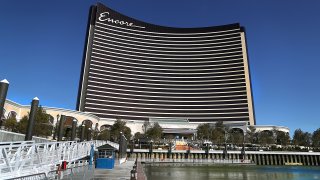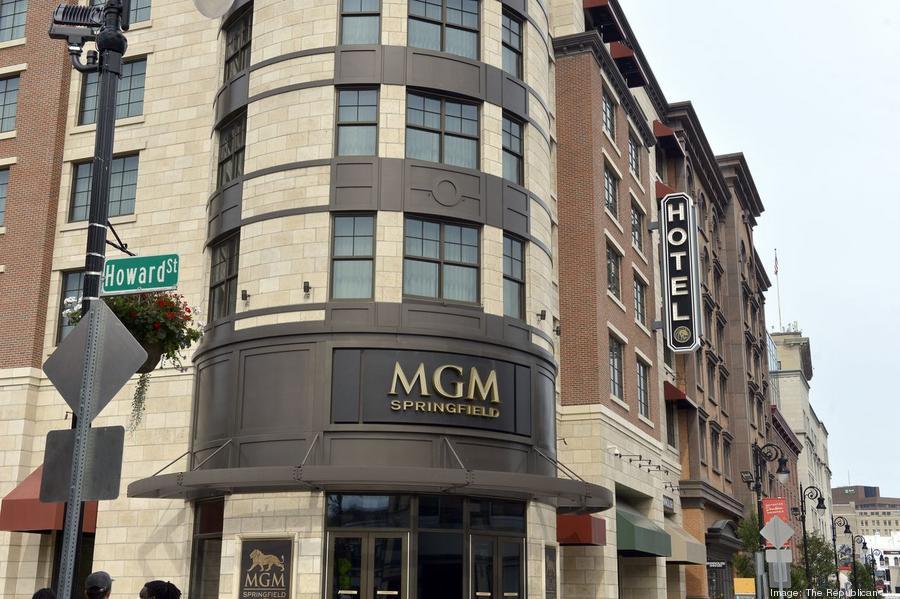
The third time was the charm for the Massachusetts Gaming Commission as its regulators voted Thursday to award the state's first sports betting license to Encore Boston Harbor after deferring similar votes for other outlets earlier in the week.
The commission's unanimous vote put the Everett casino owned by Wynn Resorts a big step closer to accepting in-person wagers on professional and most college sports, though it cannot accept bets just yet. The commission is targeting "late January" for the start of in-person betting at Encore, as well as at the other two gambling centers it already regulates, Plainridge Park Casino and MGM Springfield. Mobile betting could follow by "early March" unless the commission runs into complications.
WATCH ANYTIME FOR FREE
Stream NBC10 Boston news for free, 24/7, wherever you are. |
"I think that this is great for the commonwealth. I know we took the vote saying that, but I do think it's great for the commonwealth," Commissioner Jordan Maynard said, referring to the commission's determination and vote that awarding Encore a sports betting license would "benefit the commonwealth."
Encore was the only of the three so-called Category 1 applicants that secured license approval on the same day that the commission first considered its application. On Tuesday, the commission deferred its vote on the application from Plainridge Park Casino in Plainville and on Wednesday put off a vote on MGM Springfield's application.
Get updates on what's happening in Boston to your inbox. Sign up for our News Headlines newsletter.
More on sports betting in Massachusetts
While the Encore application did not spark as many administrative or policy concerns in commissioners as the other applications did, the Everett casino's hearing Thursday was not without some hiccups. For one thing, the Gaming Commission realized halfway through Thursday's meeting that Encore had not submitted a specific section of their application and the regulators had to vote to agree to accept the late submission.
Commissioners also raised concerns about Encore's plan to put sports betting kiosks in an area of its parking garage for "express" betting. The casino said it would be filing a petition to expand its official gaming floor to include the parking garage sportsbook and other new gaming areas. Because that request would have to be approved on its own before Encore could take bets in its parking garage, commissioners decided they could get into their questions about security at a later meeting.
"I'm not 100% convinced one way or the other on whether the gaming floor should be expanded to include that," Commissioner Eileen O'Brien said. "I don't think it needs to hold this up today. I just make that point that my thumbs up on sufficiency of this application has absolutely no bearing on what I'm going to say or vote on when it comes back in front of us procedurally for a request to actually expand and create that space."
Plainridge Park Casino
While references to information in a yet-to-be-reviewed online betting license from Plainridge Park gave commissioners reason enough to defer a decision on the slot parlor's in-person betting application Tuesday, some regulators also raised serious concerns about the connection between Plainridge Park and Barstool Sports.
The concerns are serious enough that the commission's chairwoman said the matter puts them at a "crossroads."
In January 2020, Plainridge parent company Penn Entertainment bought a 36% stake in Barstool in a transaction valued at roughly $163 million and could assume 100% ownership. Plainridge General Manager North Grounsell told commissioners this week that his Plainville facility's sportsbook is going to be "a Massachusetts-centric fully integrated Barstool-branded sportsbook and restaurant."
Led by the self-professed "degenerate gambler" David Portnoy, the Boston-founded Barstool has long been a controversial brand with its "blackout" parties, the company's refusal to remove a naked picture of Tom Brady's 2-year-old son from its website, and Portnoy's history of crude, misogynistic and racist comments.
The issue bubbled over during a discussion of the responsible gaming portion of Plainridge's application, but commissioners also made clear that their concerns extend to the overall suitability of Barstool, or a company so closely tied to Barstool, to be part of the gambling world in Massachusetts.
"I'm concerned about some of the historical marketing associated with Barstools, and in particular, when you look at some of the coverage this year, and in particular, the recent coverage in the New York Times about some of the conduct of Barstools," O'Brien said. "This may be partially here and partially in suitability, but I would like to have a discussion about that and some of the things that are brought up in the article in terms of marketing and advertising that maybe is going toward college age students, and then some of the other types of advertising and marketing that you guys have hitched yourselves to."
Plainridge and Penn officials knew that Massachusetts regulators were concerned about Portnoy's influence even before they gave the commission a heads-up on the November article in the New York Times. In the wake of previous articles that raised sexual misconduct allegations against Portnoy, the Gaming Commission earlier this year put Penn on notice that it would be keeping a very close eye on Portnoy and Barstool.
O'Brien later added, "To not acknowledge the fact that there is a lot that goes with David Portnoy being the main marketer of Barstool and that the applicant has hitched itself to that company, to that brand deliberately -- the bar in PPC will be named after it, et cetera. To me, not delving into what that means in terms of suitability, honesty, integrity of the applicant, I think bears a discussion by this commission."
Erin Chamberlin, Penn's senior vice president of northeast operations, told commissioners that Barstool personalities have created responsible betting messages that are targeted to their young audience.
"I have seen that it cuts through, I believe, a lot of the clutter," she said. "It's a very innovative approach to responsible gaming. It speaks to younger people in a different type of voice that I think resonates with them and really makes it stand out a little bit differently."
At one point during Tuesday's hearing, Chairwoman Cathy Judd-Stein asked Chamberlin and other Penn executives who were trying to paint a picture of Barstool as responsible gambling advocates whether they were truly being "genuine here."
"Because I believe that Penn Entertainment brought the article to the attention of [the commission's Investigations and Enforcement Bureau]. I don't believe you would have brought that to the attention of the IEB if you thought that they are -- that they, and I'm using they because you're using the word they -- that your spokespeople for Barstools are advocates for responsible gaming. If that were the case, why would you bring that article to the attention of IEB because you wouldn't assume that there's some risk attached to that article," she said.
Judd-Stein added, "So I just want to make sure we're all being very, very, very clear here that the regulators here in Massachusetts are really at a crossroads because the timing of this article is such that it's right when we are having these conversations. So now we have an obligation to reconcile what is very available publicly as to Barstool and really, the significant personality attached Barstool, and what we're going to do about it as we think about this application."
MGM Springfield
It has been one misstep after another on the road to a sports betting license for MGM Springfield, the state's first resort-style casino. First, the Springfield casino missed the commission's application deadline and regulators had to formally vote to accept the late application.
"We were struggling to do both the BetMGM application and our application at the same time and there was a mix-up," MGM Springfield Vice President and Counsel Gus Kim told the commission late last month. He also told regulators, "I am so sorry that it happened but as soon as we realized that there was an issue, we corrected the problem."
If MGM Springfield hurried to get its in-person betting application done, it showed when the commission dove into it on Wednesday.
"I was not terribly pleased with the fact that much of the application references the BetMGM application. So a lot of the detail that I think, for me, would be necessary in order to completely, comprehensively consider the Category 1 application is essentially missing from this application, again, understanding that there are significant references to the BetMGM application and it will be a few more days until we get to that particular application," Commissioner Nakisha Skinner said.
O'Brien had some of the same concerns, saying that "it was a little frustrating to see a reference to go see this application that wasn't actually part of this application" but that "I know that is a creature of how we've had to structure these hearings."
"Some of the questions that I have really aren't going to be before us until next week," she said.
Judd-Stein offered MGM Springfield some free advice: "Every time it says 'go to BetMGM,' you might want to take your answer that is in BetMGM and copy it and put it into the application … so that we have an application that when you read it from page to page, we don't have to go to another application for a different category."
The chairwoman said that MGM Springfield did just that for some questions in the application but that at some point "they just decided, 'I'm not even going to copy and paste it anymore, I'm just gonna say just go to the other application.'"
MGM Springfield officials agreed Wednesday to supplement their initial application with more detailed information.
Next Steps
The Gaming Commission is expected to hold meetings starting next week to review the five applications that came in for mobile betting operations tied to one of the casinos or the slots parlor. That would give commissioners a chance to dive more deeply into the connections between PPC and MGM Springfield and their mobile operators.
Next month, the commission plans to hold similar hearings on the six applications for "untethered" mobile betting. That is the only competitive category, though commissioners could elect to award a license to each applicant since they did not get applications for the maximum number of untethered licenses (seven).



